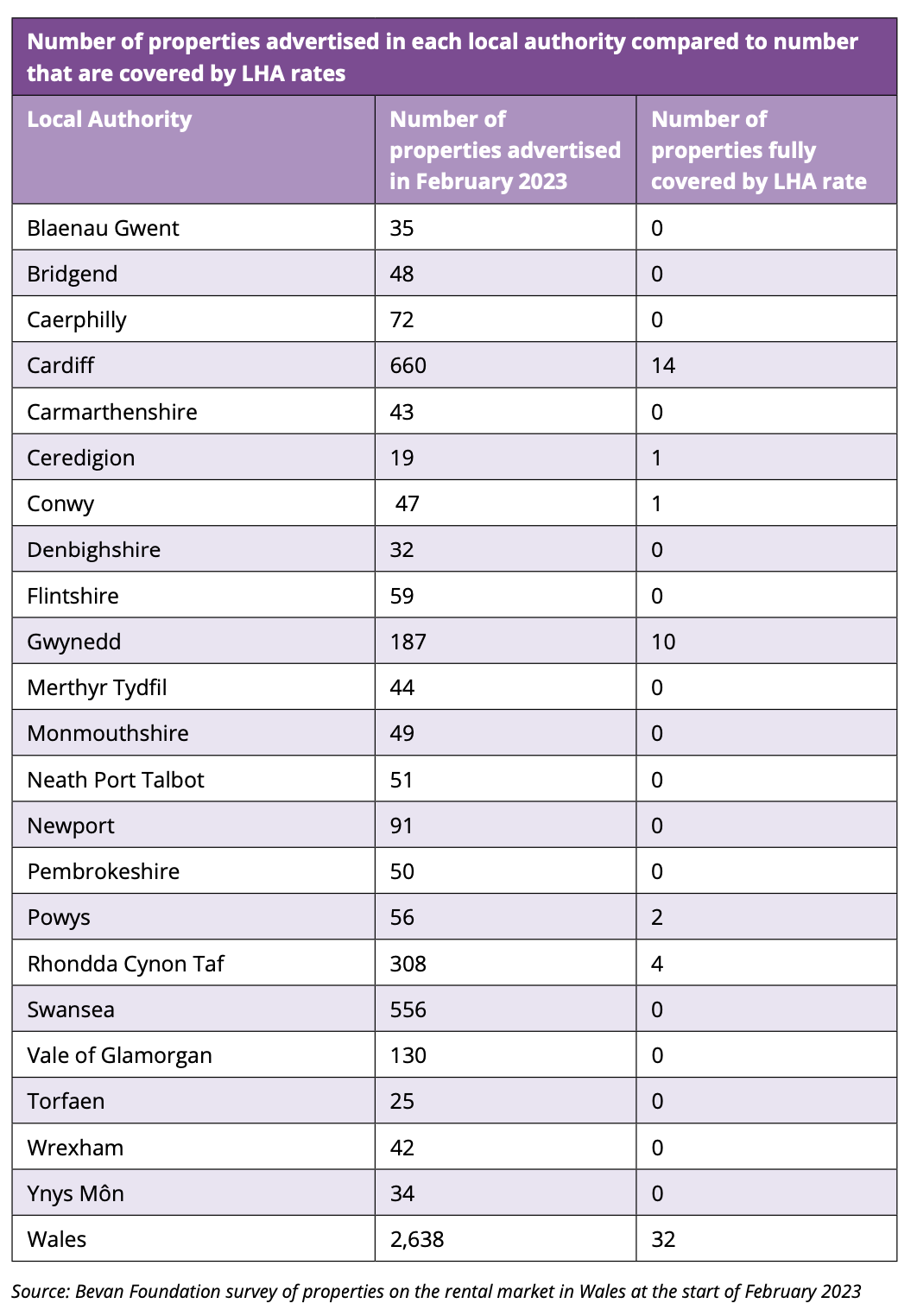A survey by the Bevan Foundation in February found that just 32 private rented properties across Wales were affordable within Local Housing Allowance rates and that even fewer were accessible to low-income tenants. Rob King reports.
 Affordable and high-quality housing is not a luxury, but a right that is presently denied to many in Wales, especially low-income households. This challenge is particularly acute in the private rented sector. Rents have risen significantly in recent months and tenants in the private rental sector are finding it increasingly difficult to find suitable and affordable accommodation on the market.
Affordable and high-quality housing is not a luxury, but a right that is presently denied to many in Wales, especially low-income households. This challenge is particularly acute in the private rented sector. Rents have risen significantly in recent months and tenants in the private rental sector are finding it increasingly difficult to find suitable and affordable accommodation on the market.
This puts financial, physical and mental strain on low-income households and forces them to choose between three impossible options: renting unsuitable or poor-quality accommodation; paying rents in excess of what they can afford placing them under financial stress; or seeking support from local authority homelessness support services.
The support households in the private rental sector are entitled to receive is calculated by the Local Housing Allowance (LHA). In theory, LHA is supposed to cover the lowest 30th percentile of rents within given market areas referred to as Broad Rental Market Areas (BRMAs). There have long been concerns regarding the adequacy of LHA rates, but these concerns have become especially pronounced in recent year as LHA rates have remained capped at the rates set for 2020.
The crisis facing renters is becoming increasingly acute. New research by the Bevan Foundation has found that only 32 out of 2,638 properties on the market in Wales at the start of February 2023 were covered fully by their respective LHA rates. This amounts to 1.2 per cent of the market.
On top of this, tenants in the private rented sector have to grapple with additional requirements that many private landlords put on their properties that potential letters have to fulfil. These requirements are often discriminatory, unfair and difficult to meet for low-income tenants, including ‘professional only’ requirements, or guarantors and minimum income checks. When these requirements are taken into account, the picture becomes even more bleak with only nine properties available across the entire country. In percentage terms this amounts to just 0.34 per cent of all properties on the market.
This problem is not a localised one, but one felt across Wales. Of the 22 local authorities in Wales only six had any properties available that were fully covered by LHA rates at the start of February. When landlord requirements are taken into account, just four local authorities had any properties advertised on the rental market at LHA rates that would be accessible to low-income tenants.
There is also significant variation in the size of the gap by property type and between local authorities. In all local authorities bar two (Blaenau Gwent and the Vale of Glamorgan) the largest shortfalls between rents and LHA rates are found in four-bedroom properties. The largest gap between LHA and the cheapest property on the market we found was in Ynys Môn where the gap stood at £851.78 a month for four-bedroom properties.
The smallest gaps tend to be found for one-bedroom properties. The smallest gap in Wales between LHA and the cheapest property on the market was for one-bedroom properties in Swansea, with only a £1.24 shortfall between LHA rates and the asking rent. Torfaen has the highest gap across properties, with no gap being smaller than £371.05 (one-bedroom properties) and the largest being £636.78 for a four-bedroom property. A household letting the cheapest available one-bedroom property in Torfaen as of February would see a gap of £4,452.60 between their rent and LHA over the course of a year.

It is clear that housing market in Wales is in crisis. Low-income households are in a situation where they cannot afford adequate housing, and the pressure on homelessness support services across Wales is building to a boiling point. The situation needs urgent action. In March the Bevan Foundation shared our findings at a meeting of the All Party Parliamentary Group for Homelessness at Westminster. At the meeting several organisations called on the UK Government to unfreeze LHA at its spring Budget, with these calls also being echoed by members of the Homes for All Cymru Coalition. While the UK Government failed to make any tangible commitment either to uplifting LHA or addressing the housing crisis more broadly in the budget, the Bevan Foundation will continue to push for the needed to uplift LHA, alongside our partners.
While LHA remains set at a UK level, there are mechanisms that the Welsh Government could utilise to alleviate some of the most severe affects of the housing crisis in Wales. The Bevan Foundation has called on the Welsh Government to make better use of these powers. One suggestion we have made that has already achieved significant support is utilising devolved mechanisms to improve and expand data gathering on the rents charged by private landlords within the private rental sector, and to make this data publicly available and accessible. Improved data could see LHA rates better reflect market conditions in Wales if LHA rates were to be uplifted in future years.
Uplifting LHA and improved data gathering alone are not long-term solutions to Wales’ housing crisis. A more unified strategic approach is needed to address the fundamental structural issues that allowed this crisis to reach the point that it has today. In the short term, maximising the support that local authorities can provide through Discretionary Housing Payments could ease some of the challenges faced by renters. Exploring methods to rapidly expand social housing would both alleviate some of the more drastic issues in the short term as well as provide a foundation for a longer-term vision of housing in Wales. Creating a Welsh benefits system would ensure low-income households are able to easily access support they are entitled to receive but currently often miss out on, easing financial pressure.
Adequate and affordable housing provides a foundation for good health – physical and mental – stable and healthy childhoods, community wellbeing and economic stimulation. Addressing the housing crisis – both short term and long term – would be a much-needed steppingstone in addressing the wider issues facing Wales, both now and in the future.
Rob King is housing policy officer at the Bevan Foundation